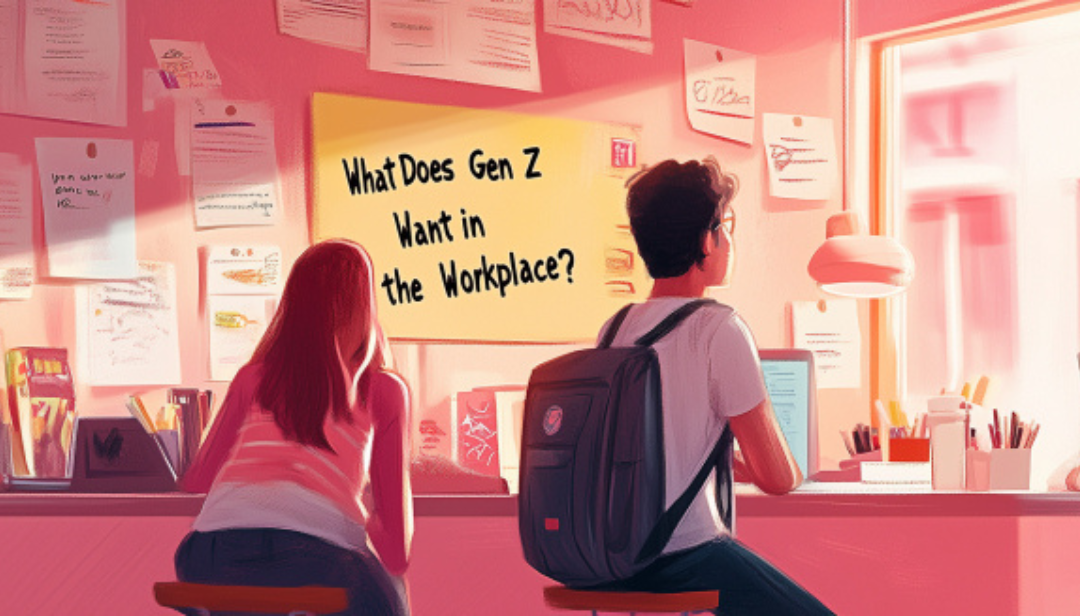What Do Gen Z Employees Want from a Job? Generation Z Workplace Requirements to Be Happy and Productive
Having grown up in the digital era and facing different political and socio-economic challenges, the Gen Z workforce brings with it unique preferences and a fresh perspective that will shake the workplace and business leaders. Let's learn what these young people want in a job and what how to attract Gen Z in the workplace.


Back
7 mins read
With new generations entering the workforce every few years, the workplace is bound to keep changing as each generation brings its own values, qualities, and traits.
For instance, when it comes to employment, Baby Boomers valued job stability and competitive compensation; Generation X desired career growth and work-life balance, while the biggest percentage of the workforce, the Millennials and Gen Zs, seek everything from mental health to diversity to flexibility.
Just behind the Millennials, who are expected to account for 75 percent of the global labor force by 2025, is the more vibrant Generation Z workforce, which is expected to represent 27 percent of employees by the same year.
Also known as the post-millennials, Zoomers, Gen Z, or the iGeneration, Generation Z is the most diverse generation bound to shake things up at the workplace with different approaches to corporate culture, career, and success.
Look around you, and you’ll notice how teenagers and young people are vocal about issues of mental health, self-expression, and social justice. That is the same zeal this new generation is bringing to the workforce.
So, what kind of jobs are these young employees looking for? What workplace requirements will make a Generation Z worker happy, motivated, and productive? How different is Generation Z in the workplace compared to previous generations?
Let’s find out.
Related: Bored or Feeling Stuck at Work? Learn what you can do about it.
Who Are Gen Z Workers?

Generation Z employees are those born between 1997 and 2012, with the eldest being 27 years old as of 2024. A considerable portion of this new generation has entered the workforce, with older members already established in their careers and younger members just starting to enter the job market.
Being the first generation ever to grow up entirely in the internet era, Gen Zers are also often called “digital natives.” Their world is centered around the latest tech, which makes them both tech-savvy and tech-dependent. They care more about the newest smartphones, apps, and virtual reality gaming headsets and are eager to multitask and try different social media platforms.
Gen Z employees are, therefore, different from the older generations (Baby Boomers, Generation X, and Millennials workers).
Their distinct characteristics are shaped by their early exposure to technology and other political and economic factors. Many of the younger employees witnessed events such as the attack on New York’s World Trade Center, the Great Recession, a governmental "insurrection," and a global pandemic.
Many Gen Zers started their careers during an impending recession, mounting student loan debt, growing inflation, and housing crisis. They have also faced adverse occurrences such as increased gun violence, social instability, and war.
In short, Gen Z has experienced some hardships, and it defines how they behave in the workplace.
What Do Gen Z Employees Seek in a Workplace to Be Happy and Productive?

Younger millennials and Gen Z employees have distinct expectations and preferences regarding the workforce, emanating from various factors. Here are some things this group of workers is looking for in a job.
1. Balance and Flexibility
Flexibility seems to be the number one thing Gen Z is looking for in employment.
While it is defined differently by different workers and employers, flexibility for Gen Z is the ability to work flexible hours outside the regular 9-5 hours. It also means being able to perform different tasks within a role. They seek out new experiences and won’t be comfortable staying in a job that requires them to perform the same tasks every other day. This is why much of Generation Z has embraced the gig economy and freelancing instead of more traditional job opportunities.
Gen Z values a healthy work-life balance and would love to work in organizations and roles that allow flexible work options, such as remote work.
After all, the two years of lockdown during the COVID-19 pandemic meant they had to learn how to be productive away from the office. Gen Z will, therefore, prefer working remotely or as freelancers because of the flexibility of schedules and the ability to work from anywhere. Many also pursue entrepreneurial endeavors at a young age.
Gen Z cares about their mental well-being, and they don’t want a hostile work environment that will likely lead them to mental illnesses such as stress, anxiety, and depression (as well as the potential burnout their elders are facing in alarming numbers). They are, therefore, looking to strike a healthy balance between career development and personal fulfillment. Roles that support work-life balance, self-care, and a person-first culture will allow for seamless work-life integration.
2. Authenticity: Fostering a Culture of Individuality
Gen Z workers would rather be true to themselves than conform to societal norms or corporate culture. In other words, they will not pretend to be someone else just to fit in. They wish to be acknowledged and valued for their unique talents and strengths.
This is understandable because these young workers have diverse perspectives and are not afraid to share their valuable insights with colleagues and company management.
When allowed to be authentic, Gen Z employees feel empowered and develop a sense of belonging that motivates them to share their best talents and fresh ideas, promoting innovation and creativity in the workplace.
3. Building Connections and Mentorship Programs
Generation Z employees aren’t just interested in completing tasks but in building meaningful connections with others as well. A collaborative environment with a strong organizational culture and community will appeal to this group of workers.
Gen Z are more likely to take risks, share ideas, and contribute to the organization’s success when they feel supported and connected with their workmates through genuine interactions.
It is also through authentic connections that the Gen Z workforce can create mentor relationships. Gen Z understands that mentorship is an integral part of professional growth, and they are ready to form and join those mentorship and training programs.
Even in schools, younger generations who have the support and guidance of a mentor have a 40% chance of graduating on time and a 50% chance of enrolling in college.
4. Workplace Wellness Initiatives
Most Gen Zers are just starting their careers, and this comes with a lot of uncertainty that may lead to feelings of stress and anxiety. This is normal and to be expected.
However, these younger workers grew up in the digital era, where information is at their fingertips. That means they don’t know how to deal with uncertainty. If they want food, they will order online. If they want to know where they are going, they will check Google Maps.
So, when a situation is uncertain, Gen Z may not know the best way to react, and that’s how they enter panic mode and become anxious.
Also, Generation Z is at high risk of developing both mental and physical health issues because of overdependency on technology and a sedentary lifestyle. A survey conducted by Deloitte found that 46% of both Gen Z respondents and young millennials feel anxious or stressed most of the time.
On the other hand, Gen Z is the most self-aware generation right now, and they know that burnout and stress can have long-term impacts on health, emotional well-being, career growth, and work performance.
They, therefore, prioritize their mental wellness and want a company that does the same. They will appreciate an employer who offers mental health awareness resources, flexible work arrangements, and wellness programs. In fact, 80% of them consider mental health support to be an essential factor when looking for a job.
5. Alignment with Ethical Values
Having been born into the digital world, Gen Z continues to grow up witnessing things such as the exploitation of natural resources, shunned gender issues, and social justice movements. Therefore, they have developed a strong stance and unique sensibility to equity and ethical values when running a business.
Gen Z appreciates a company whose core values align with theirs.
They want employers who care about the communities they serve, live up to their stated values, and actively engage in social responsibility efforts. This they must demonstrate by actions rather than mere words.
Companies that care about real societal challenges such as hunger, climate change, and sustainability will attract Gen Z talent. To show their seriousness in these issues, it is reported that 42% of Gen Z employees have changed jobs due to climate concerns, with 50% pushing their employers to spearhead change on environmental problems.
6. Embrace of Technology
Most Gen Z job seekers are entering the job market, having been exposed to the digital world of the internet, social media, and mobile devices. This has influenced the way they obtain information, interact, and communicate. They want constant connectivity and prefer to work in a tech-driven environment.
Gen Zers are tech-savvy job seekers and prioritize employers who readily adopt cutting-edge technologies.
7. Competitive Salary and Career Growth
If we were to be honest with ourselves, we would admit that salary is the biggest motivator for showing up to work daily. Competitive salaries and performance bonuses have always been a priority when considering a job offer, and even though Gen Z values other things such as work-life balance, financial security is still at the top when considering leaving their current employer.
Of course, compensation depends on what the employee brings to the table, and Gen Z knows this very well.
They are willing to work harder and engage in training to move up the ladder. A company that doesn’t offer career growth opportunities risks losing a third of Generation Z workers. After all, no generation wants to stay in a dead-end role.
How Different Are Gen Z Team Members from Older Generations?

Generation Z workers differ from older generations in many ways.
First, they have grown in the full glare of technology and social media, which means they are tech-savvy and are comfortable navigating different social media platforms. They seek out workplaces that embrace technology and value inclusion, diversity, and social justice.
Being constantly connected also negatively impacts this generation of workers.
A Gallup survey found that 54% of Gen Z employees are disengaged at work and don’t have a close connection with their employers, coworkers, and managers.
To succeed, young employees need to work alongside their experienced peers, informal coaches, and mentors.
They also need exposure to other levels and departments in the organization. A Gen Z employee, therefore, needs to have good time management skills to ensure they perform their duties and also seek other things that will increase their skills and set them up for success.
Another difference between Gen Z in the workplace and other generations is that many found their jobs just before or during the COVID-19 pandemic.
This meant they had to halt their plans, whether that meant going back home after college, losing their job, or working completely remotely. They had to adapt to these changes quickly, which may explain why most of them are in a mental health crisis or why they prefer a hybrid work environment and value job security. They have an entrepreneurial mindset and are willing to work hard to achieve their potential, albeit facing a few challenges
All in all, as Gen Z employees continue to enter the job market, their positive impact is bound to be felt through the workplace, technology, retail consumption, culture, and politics.
After all, every generation brings with it different expectations, unique qualities, and challenges, and Gen Z is no different. If Gen Z can find a job they love and work on their motivation and time management while taking care of their physical well-being and mental health, they’re bound to thrive, grow, and have a healthy work-life balance.
Gen Z values a more holistic approach to work, health, and personal life.


Return to Blog







